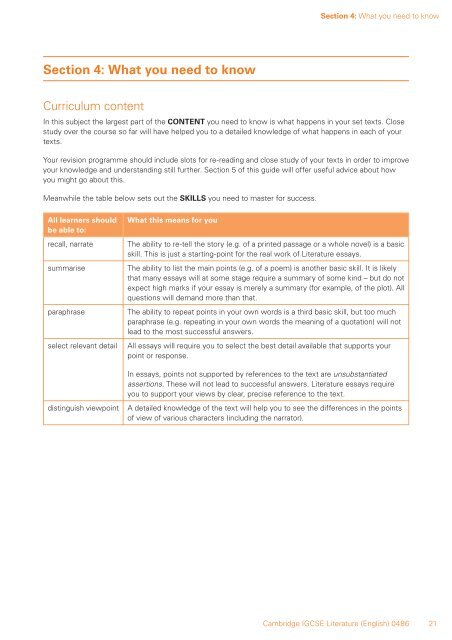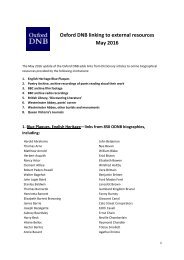Learner Guide
163029-cambridge-learner-guide-for-igcse-english-literature
163029-cambridge-learner-guide-for-igcse-english-literature
Create successful ePaper yourself
Turn your PDF publications into a flip-book with our unique Google optimized e-Paper software.
Section 4: What you need to know<br />
Section 4: What you need to know<br />
Curriculum content<br />
In this subject the largest part of the CONTENT you need to know is what happens in your set texts. Close<br />
study over the course so far will have helped you to a detailed knowledge of what happens in each of your<br />
texts.<br />
Your revision programme should include slots for re-reading and close study of your texts in order to improve<br />
your knowledge and understanding still further. Section 5 of this guide will offer useful advice about how<br />
you might go about this.<br />
Meanwhile the table below sets out the SKILLS you need to master for success.<br />
All learners should<br />
be able to:<br />
recall, narrate<br />
summarise<br />
paraphrase<br />
select relevant detail<br />
What this means for you<br />
The ability to re-tell the story (e.g. of a printed passage or a whole novel) is a basic<br />
skill. This is just a starting-point for the real work of Literature essays.<br />
The ability to list the main points (e.g. of a poem) is another basic skill. It is likely<br />
that many essays will at some stage require a summary of some kind – but do not<br />
expect high marks if your essay is merely a summary (for example, of the plot). All<br />
questions will demand more than that.<br />
The ability to repeat points in your own words is a third basic skill, but too much<br />
paraphrase (e.g. repeating in your own words the meaning of a quotation) will not<br />
lead to the most successful answers.<br />
All essays will require you to select the best detail available that supports your<br />
point or response.<br />
In essays, points not supported by references to the text are unsubstantiated<br />
assertions. These will not lead to successful answers. Literature essays require<br />
you to support your views by clear, precise reference to the text.<br />
distinguish viewpoint<br />
A detailed knowledge of the text will help you to see the differences in the points<br />
of view of various characters (including the narrator).<br />
Cambridge IGCSE Literature (English) 0486<br />
21




